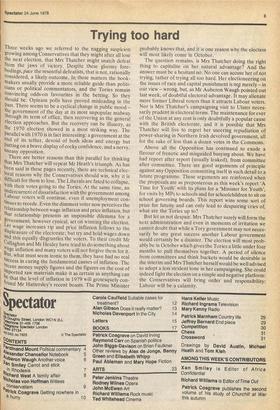Trying too hard
Three weeks ago we referred to the nagging suspicion growing among Conservatives that they might after all lose the next election, that Mrs Thatcher might snatch defeat from the jaws of victory. Despite these gloomy forebodings, pace the resentful defeatists, that is not, rationally considered, a likely outcome. In these matters the bookmakers usually provide a more reliable guide than politicians or political commentators, and the Tories remain convincing odds-on favourites in the betting. So they Should be. Opinion polls have proved misleading in the Past. There seems to be a cyclical change in public mood — the government of the day at its most unpopular midway through its term of office, then recovering as the general election approaches. But the recovery can be illusory, as the 1970 election showed in a most striking way. The Parallel with 1970 is in fact interesting: a government at the end of its tether, devoid of both ideas and energy but Putting on a brave display of cocky confidence, and a nervy, uneasy opposition.
There are better reasons than this parallel for thinking that Mrs Thatcher will repeat Mr Heath's triumph. As has been said in these pages recently, there are technical electoral reasons why the Conservatives should win, why it is difficult for them to lose. The Liberals are fated to collapse, With their votes going to the Tories. At the same time, an undercurrent of dissatisfaction with the government among Labour voters will continue, even if unemployment continues to recede. Even the dimmest voter now perceives the relationship between wage inflation and price inflation, but that relationship presents an impossible dilemma for a Pvernment, however cynical, set on winning the election. Let wage increases rip and price inflation follows to the displeasure of the electorate; but try and hold wages down and this equally disgruntles the voters. To their credit Mr Callaghan and Mr Healey have tried to do something about age inflation and many voters will not forgive them for it. Out, what must seem ironic to them, they have had no real sUccess in curing the fundamental causes of inflation. The r.ecent money supply figures and the figures on the cost of lit Ported raw materials make it as certain as anything can e that the level of inflation in 1979 will grotesquely con'c'und Mr Hattersley's recent boasts. The Prime Minister probably knows that, and it is one reason why the election will most likely come in October.
The question remains, is Mrs Thatcher doing the right thing to capitalise on her natural advantage? And the answer must be a hesitant no. No one can accuse her of not .trying, rather of trying all too hard. Her electioneering on the issues of race and capital punishment is not merely — in our view — wrong, but, as Mr Auberon Waugh pointed out last week, of doubtful electoral advantage. It may alienate more former Liberal voters than it attracts Labour voters. Nor is Mrs Thatcher's campaigning visit to Ulster necessarily prudent in electoral terms. The maintenance for ever of the Union at any cost is only doubtfully a popular cause with the British electorate, and it is possible that Mrs Thatcher will live to regret her sneering repudiation of power-sharing in Northern Irish devolved government, all for the sake of less than a dozen votes in the Commons.
Above all the Opposition has continued to exude a flavour of frenetic and misguided busying about. We have had report after report (usually leaked), from committee after committee. There are good arguments of principle against any Opposition committing itself in such detail to a future programme. These arguments are reinforced when the proposals are as preposterous as this week's report 'A Time for Youth' with its plans for a 'Minister for Youth', for visits by MPs to schools and for schoolchildren to sit on school governing boards. This report wins some sort of prize for fatuity and can only lead to despairing cries of, what are the Tories up to?
But let us not despair. Mrs Thatcher surely will form the next administration and even in moments of irritation we cannot doubt that while a Tory government may not neces sarily be any great success another Labour government would certainly be a disaster. The election will most prob ably be in October which gives the Tories a little under four months to pull themselves together. A period of silence from committees and think buckets would be desirable in the interim and Mrs Thatcher herself would be well advised to adopt a less strident tone in her campaigning. She could indeed fight the election on a simple and negative platform: the Conservatives will bring order and responsibility: Labour will be a calamity.














































 Previous page
Previous page